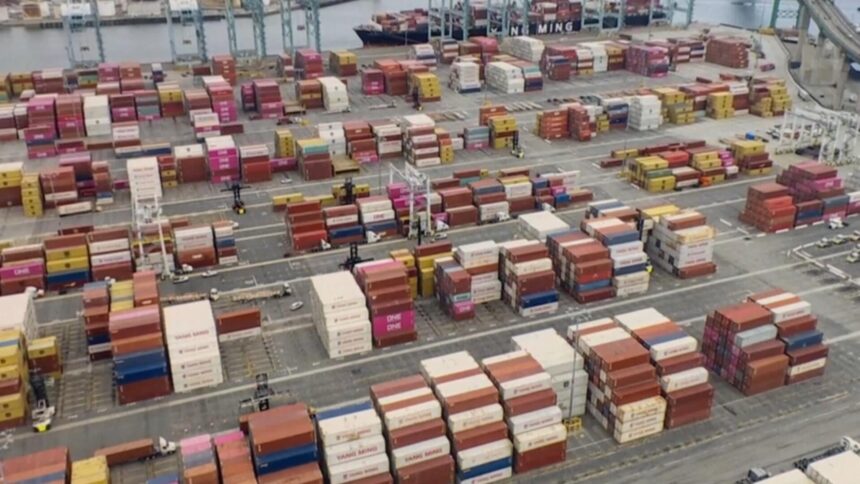U.S. postal traffic has massively declined by over 80% following the decision of United States President Donald Trump to eliminate the de minimis exemption for low-value parcels.
The Universal Postal Union (UPU), a United Nations agency overseeing global postal cooperation, reported that U.S. postal traffic dropped 81% on August 29 compared to the previous week.
The agency said 88 postal operators suspended services to the U.S. due to the new customs requirements.
“The global network saw postal traffic to the U.S. come to a near-halt after the implementation of the new rules on Aug. 29, 2025, which for the first time placed the burden of customs duty collection and remittance on transportation carriers or U.S. Customs and Border Protection agency-approved qualified parties,” the UPU said in a statement.
The agency added that the “major operational disruptions” occurred because some airlines and other carriers indicated they weren’t willing or able to collect such duties, and foreign postal operators had not established a link to CBP-qualified companies.
Speaking with the press, Blair Nadeau, a Canadian bridal accessories business owner, said: “This is devastating on so many levels, and millions of small businesses worldwide are now having their careers, passions, and livelihoods threatened. Just this past hour, I have had to turn away two U.S. customers, and it broke my heart.”
Also, Alexandra Birchmore, an artist based in the Cotswolds region of England, said she expected to raise the price of her oil paintings on Etsy by 10% as a result of paying the duties upfront.
“At the moment every small business forum I am on is in chaos about this,” Birchmore said. “It looks to me to be a disaster where no one benefits.”
Pan-Atlantic Kompass reports that the development comes after Trump signed an executive order to end the duty-free status for imports valued at $800 or less.
Trump, in the executive order said: “By the authority vested in me as President by the Constitution and the laws of the United States of America, including the International Emergency Economic Powers Act (50 U.S.C. 1701 et seq.) (IEEPA), the National Emergencies Act (50 U.S.C. 1601 et seq.), section 604 of the Trade Act of 1974, as amended (19 U.S.C. 2483), and section 301 of title 3, United States Code, it is hereby ordered:
“Section 1. Background. In Executive Order 14193 of February 1, 2025 (Imposing Duties To Address the Flow of Illicit Drugs Across Our Northern Border), I declared a national emergency regarding the unusual and extraordinary threat to the safety and security of Americans, including the public health crisis caused by fentanyl and other illicit drugs and the failure of Canada to do more to arrest, seize, detain, or otherwise intercept drug trafficking organizations, other drug and human traffickers, criminals at large, and illicit drugs. In that order, I determined that it was necessary and appropriate to, among other things, suspend duty-free de minimis treatment under 19 U.S.C. 1321(a)(2)(C) for articles described in section 2(a) and section 2(b) of that order. In Executive Order 14226 of March 2, 2025 (Amendment to Duties To Address the Flow of Illicit Drugs Across Our Northern Border), I paused the suspension of duty-free de minimis treatment on such articles until I received a notification from the Secretary of Commerce (Secretary) that adequate systems are in place to fully and expeditiously process and collect duties for such articles that would otherwise be eligible for duty-free de minimis treatment.”
Speaking on the decision during a press conference, Trump called the exemption “a big scam.”
He said: “It’s very important, de minimis. It’s a big deal. It’s a big scam going on against our country, against really small businesses, and we’ve ended it. We put an end to it.”
Trump declared that suspending de minimis will help the U.S. lower its trade deficit, and make it harder to import illegal drugs like fentanyl.
Pan-Atlantic Kompass reports that the de minimis exemption, has been implemented since 1938. The exemption allowed low-cost imports to enter the U.S. without customs duties.
Recall also that the Nigerian Postal Service (NIPOST) had announced that Nigerians sending parcels to the U.S. will pay a $80 customs duty on all shipments except letters and documents.
NIPOST said: “The Nigerian Postal Service wishes to inform our esteemed customers of a recent policy change by the Government of the United States of America, enacted through the Executive Order on ‘Suspending Duty-Free De Minimis Treatment for All Countries’ under the International Emergency Economic Powers Act.
“This Executive Order applies to all postal operators and designated postal administrations worldwide, and the payment of the additional duty affects all global postal inflows into the United States, not just those from Nigeria.
“Global logistics operations are also being affected, as airline and cargo carriers adopt more cautious measures in handling U.S.-bound shipments. This may extend both transit and processing times, potentially resulting in delivery delays.”





